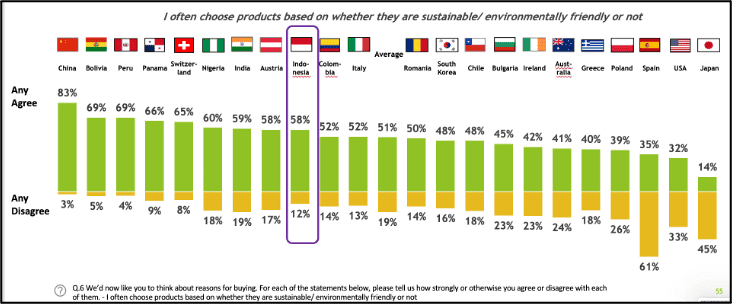Indonesia faces significant environmental challenges, producing over 7.8 million tonnes of waste annually. Alarmingly, 60% of this waste remains uncollected and improperly managed, creating severe threats to ecosystems and public health. To address this, the country is increasingly pushing the Indonesia Sustainable Materials Adoption, particularly in construction. As a result, it can be seen as a solution to reduce waste and support environmental preservation.
Indonesia Sustainable Materials Adoption: Government’s Commitment to Sustainability
The Indonesian government is taking strong action to confront its waste problem. It has set ambitious goals to reduce plastic waste by 30% and increase waste management efficiency to 70% by 2040. These efforts highlight the government’s commitment to sustainability.
A cornerstone of this transformation is the development of Nusantara, Indonesia’s new capital city. Over 75% of Nusantara’s governmental zone is planned to be green, signaling a significant shift toward eco-friendly urban planning. By incorporating Indonesia Sustainable Materials Adoption into its construction, Nusantara serves as a model for how cities can embrace environmental responsibility while preparing for future growth.
Green Building Potential with Indonesia Sustainable Materials Adoption
The construction industry is a major focus in Indonesia’s sustainability efforts. With urbanization expected to reach 67% by 2035, the country faces mounting pressure to accommodate a growing population in its cities. This presents a critical opportunity to prioritize sustainable building practices. By using eco-friendly materials, such as recycled or renewable resources, Indonesia can reduce its environmental impact while meeting the demands of urban expansion.
The Role of Consumer Demand

Government initiatives are complemented by a strong cultural shift toward sustainability. Recent surveys show that 84% of Indonesians have adopted eco-friendly products in their daily lives. This growing preference for sustainability is particularly evident among younger generations. Among Indonesians aged 25 to 34, 71% report practicing sustainable habits when shopping.
This demographic is shaping future markets. As young consumers enter the workforce, purchase homes, and influence economic trends, their preference for sustainable products will drive demand for eco-friendly construction materials. This shift underscores the importance of aligning industrial practices with consumer expectations with Indonesia Sustainable Materials Adoption.
Transforming Waste Into Resources
Indonesia Sustainable Materials Adoption offer a promising way to address the nation’s waste crisis. For instance, recycled plastics can be repurposed into durable building materials, reducing the reliance on traditional resources and cutting down on landfill waste. These innovations contribute to the global movement toward a circular economy, where materials are reused and repurposed to minimize waste.
Such practices not only mitigate environmental harm but also present economic opportunities. By turning waste into valuable resources, Indonesia can reduce the costs of construction while promoting environmental sustainability.
Nusantara: A Model for the Future of Indonesia Sustainable Materials Adoption
The development of Nusantara encapsulates Indonesia’s vision for sustainable urbanization. With its emphasis on green zones and eco-friendly materials, the city serves as a powerful example of how sustainability can be integrated into modern development. Nusantara is not just a city—it’s a statement of Indonesia’s commitment to building a greener future.
In conclusion, Indonesia Sustainable Materials Adoption is essential to meeting its environmental goals. By addressing waste challenges, leveraging government initiatives, and responding to shifting consumer preferences, the country is making meaningful progress. The integration of eco-friendly practices, particularly in construction, offers a clear path toward a more sustainable future. Not only that, but as projects like Nusantara lead the way, Indonesia demonstrates how innovative approaches to waste management and urban planning can create healthier, more sustainable environments for generations to come.

